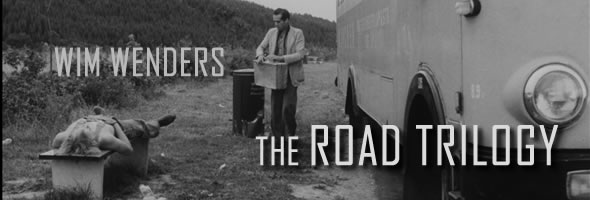
ALICE IN THE CITIES
B&W, 1974, 113m.
Directed by Wim Wenders
Starring Yella Rottländer, Rüdiger Vogler, Lisa Kreuzer
WRONG MOVE
Color, 1975, 104m.
Directed by Wim Wenders
Starring Rüdiger Vogler, Hanna Schygulla, Hans Christian Blech, Nastassja Kinski, Peter Kern
KINGS OF THE ROAD
B&W, 1976, 176m.
Directed by Wim Wenders
Starring Rüdiger Vogler, Hanns Zischler, Lisa Kreuzer
Criterion (Blu-ray & DVD) (US RA/R1 HD/NTSC) / WS (1.66:1) (16:9)
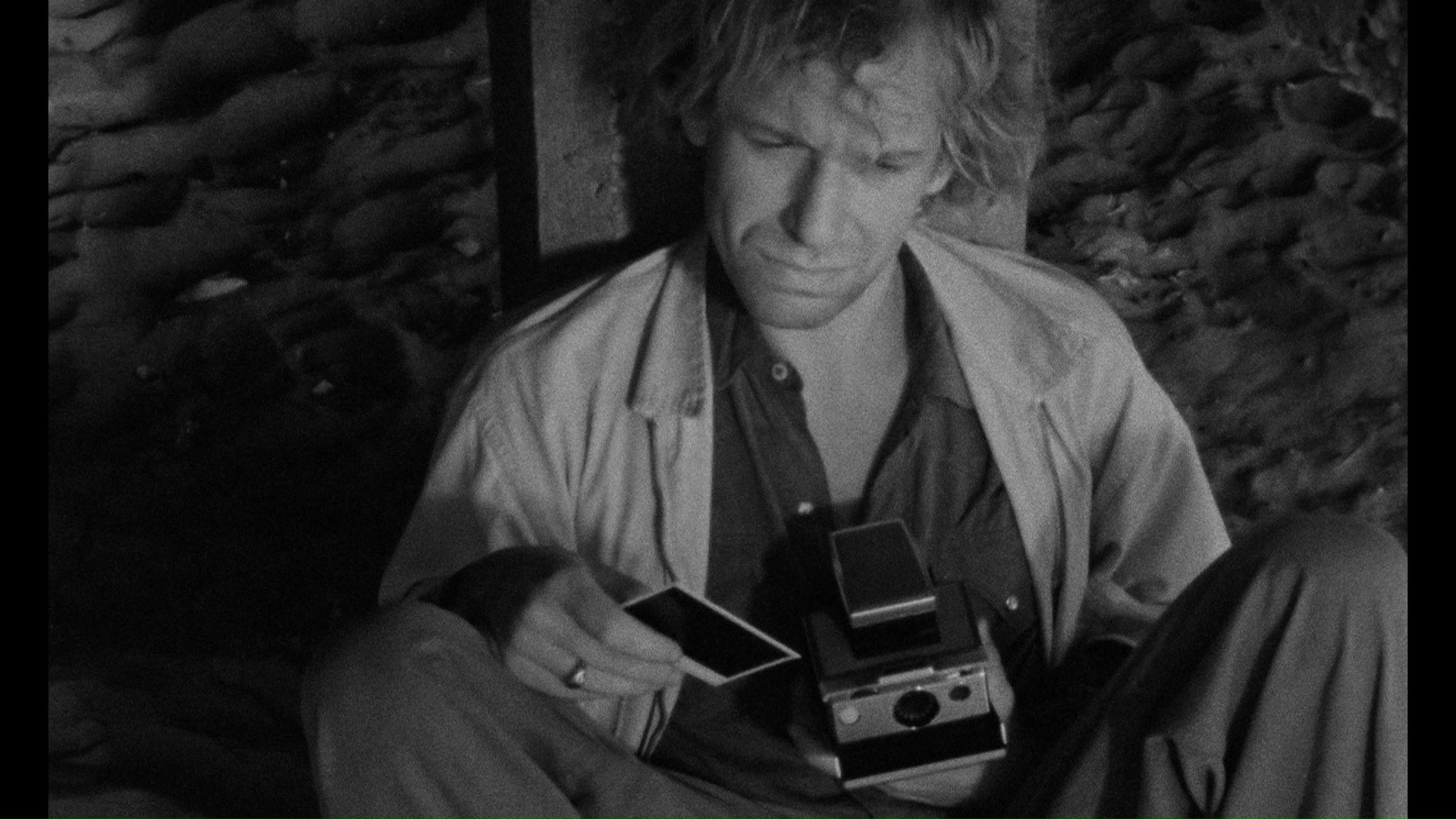
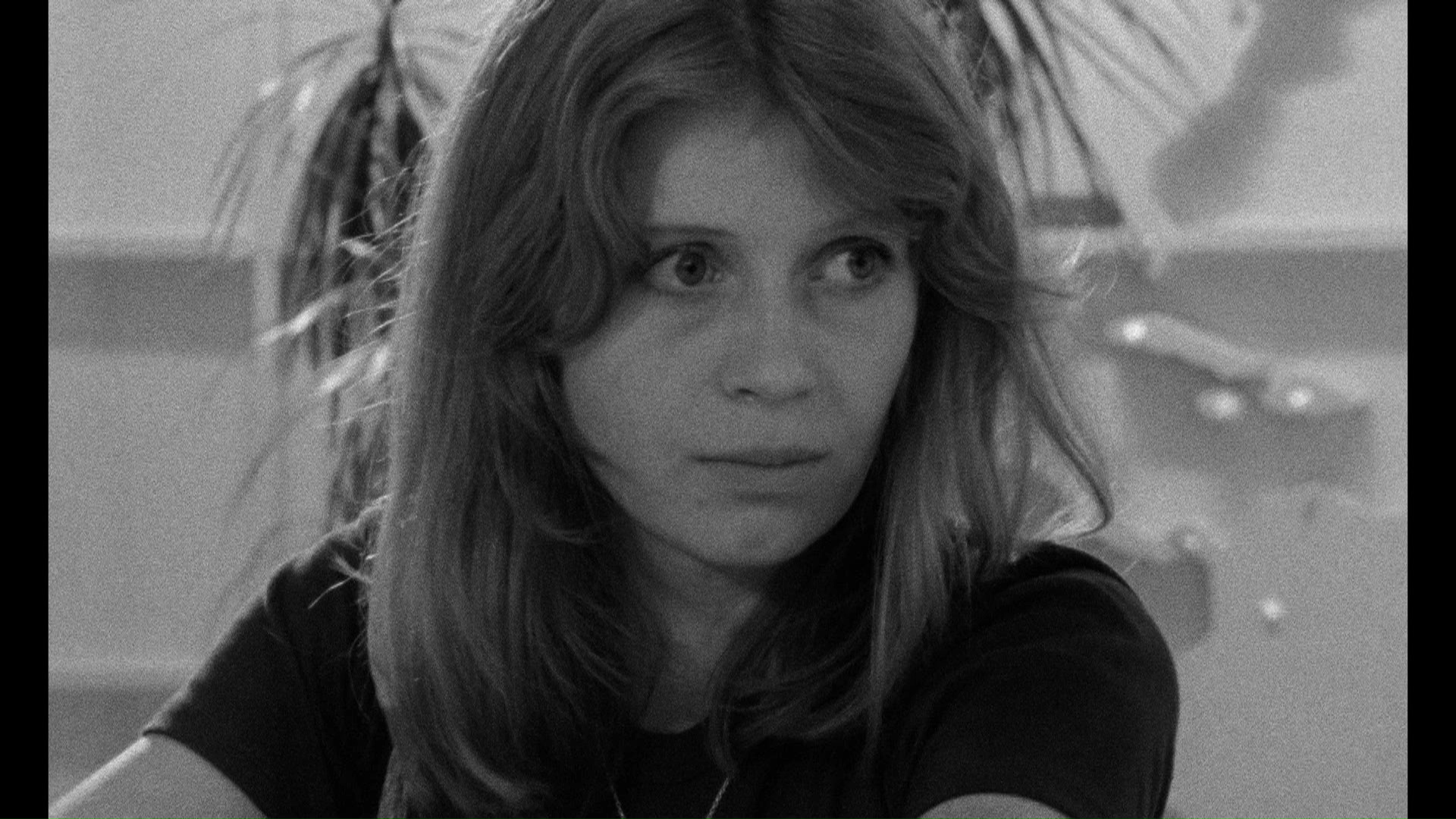 The arrival of the German New Wave in theaters around the world brought a number of filmmakers to popular attention, ranging from the outrageous visions of Werner Herzog to the piercing melodramas of Rainer Werner Fassbinder. Lower key but just as crucial was Wim Wenders, whose unpredictable career wound up spanning multiple countries (including a stint in Hollywood) with output ranging from an epic-length science fiction masterpiece to a 3-D dance documentary. However, the films that first put him on the map were those comprising his so-called road trilogy, a term applied after they were released. Though no characters or storylines weave through the three films, they do involve untethered characters traveling either to, from, or across Germany, with the subdued but magnetic Rüdiger Vogler anchoring all of them as a leading man.
The arrival of the German New Wave in theaters around the world brought a number of filmmakers to popular attention, ranging from the outrageous visions of Werner Herzog to the piercing melodramas of Rainer Werner Fassbinder. Lower key but just as crucial was Wim Wenders, whose unpredictable career wound up spanning multiple countries (including a stint in Hollywood) with output ranging from an epic-length science fiction masterpiece to a 3-D dance documentary. However, the films that first put him on the map were those comprising his so-called road trilogy, a term applied after they were released. Though no characters or storylines weave through the three films, they do involve untethered characters traveling either to, from, or across Germany, with the subdued but magnetic Rüdiger Vogler anchoring all of them as a leading man.
First up is what is usually regarded as Wenders's first mature film, Alice in the Cities, made in the wake of his frustrating adaptation of The Scarlet Letter. The film's youngest actress, Yella Rottländer, was brought back here to star as the title character, a little girl who's left with some money and a note in the care of Phil (Vogler), a German reporter looking for inspiration in America. Alice's mother (Kreuzer) indicates she'll be back for her, but Alice wants to go searching for her grandmother and takes Phil along with her. The ensuing trek through Europe brings the pair together as Alice's own viewpoint informs everything she experiences.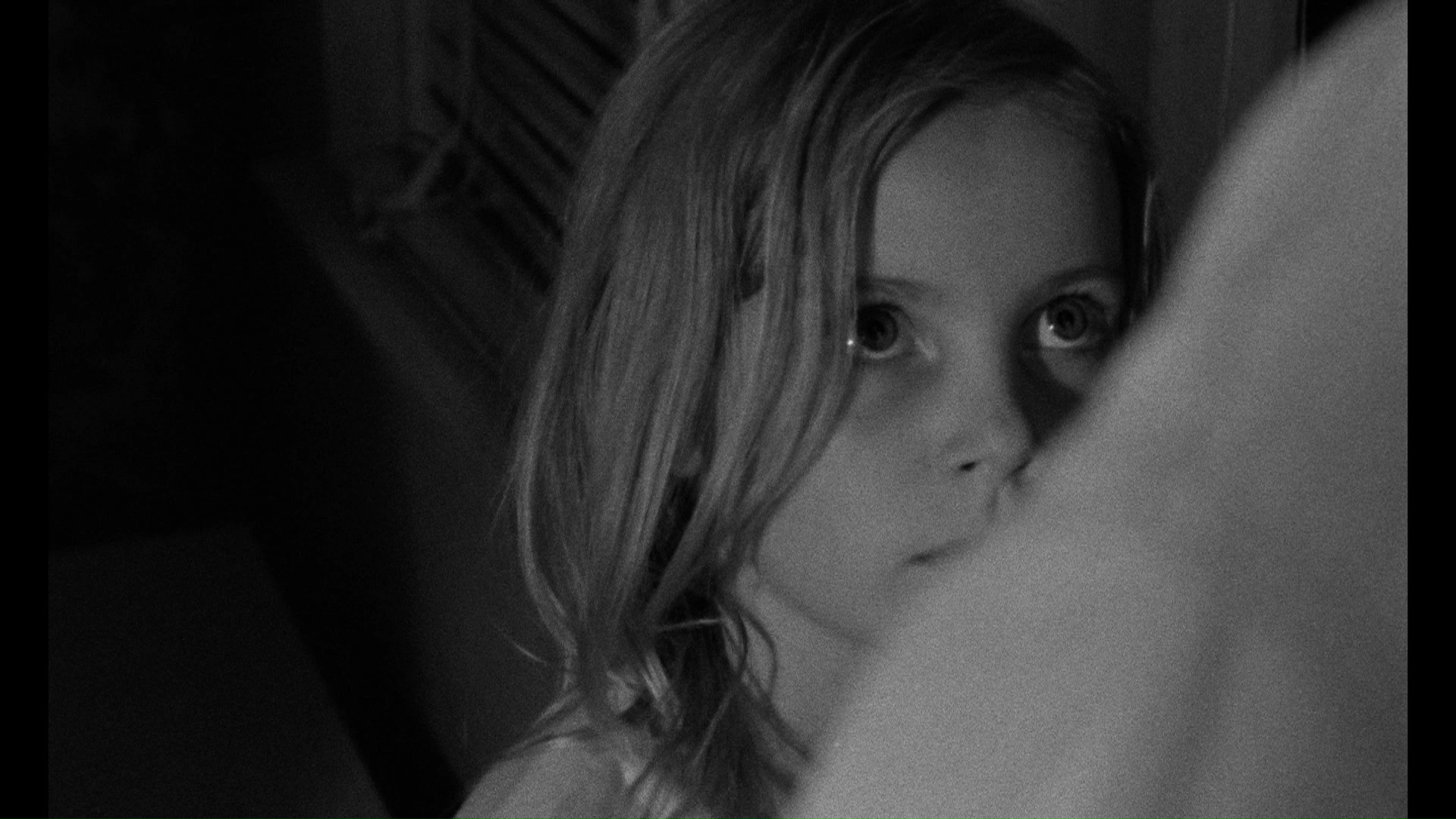
The following year, Wenders made the least discussed of the three films, Wrong Move, which also sports the largest ensemble of main characters and the least amount of significant travel time. Again Vogler is a frustrated writer, Phil, in search of a muse, 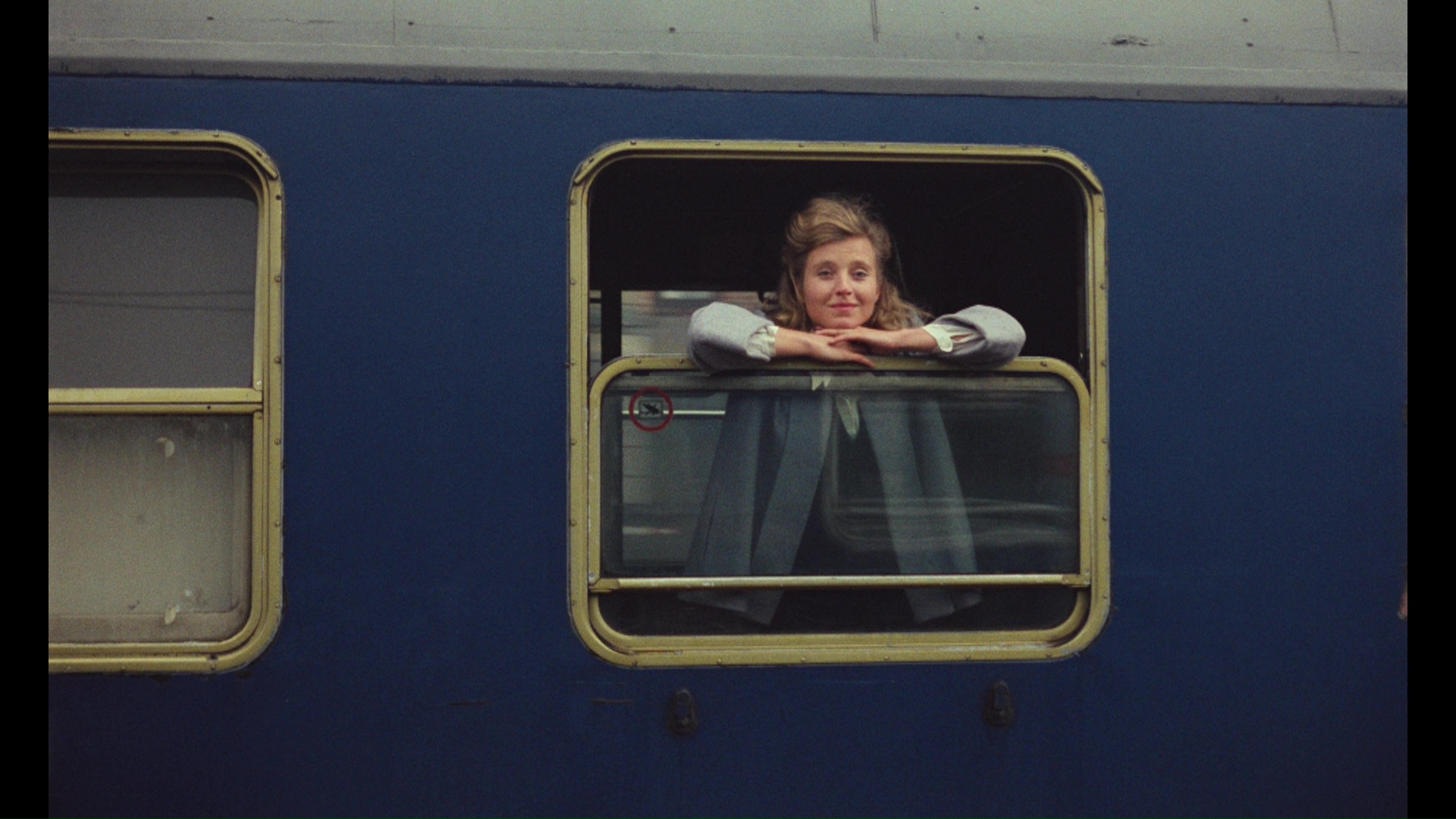 so at his mother's urging he accepts at train ticket to head to Bonn to clear his head. Along the way he strikes up a rapport with an actress named Therese (Fassbinder favorite Schygulla), mute adolescent juggler Mignon (Kinski, looking shockingly young in her debut), her former athlete grandfather Laertes (Blech), and a portly poetry fan named Bernhard (Kern). Upon arrival their journey continues as mishaps both bizarre and weirdly comic confront them, as the disillusioned Phil realizes he needs to recalibrate his perceptions of the world around him to become any sort of creative voice.
so at his mother's urging he accepts at train ticket to head to Bonn to clear his head. Along the way he strikes up a rapport with an actress named Therese (Fassbinder favorite Schygulla), mute adolescent juggler Mignon (Kinski, looking shockingly young in her debut), her former athlete grandfather Laertes (Blech), and a portly poetry fan named Bernhard (Kern). Upon arrival their journey continues as mishaps both bizarre and weirdly comic confront them, as the disillusioned Phil realizes he needs to recalibrate his perceptions of the world around him to become any sort of creative voice.
The third and most masterful film in the set is the three-hour Kings of the Road, one of the most important and memorable films from the height of the German New Wave. Shot with a cast and crew of 11 people traversing the border between West and East Germany, the film was largely improvised depending on the situations that came up as Vogler remained in character as Bruno, who travels around Germany repairing projectors at small town movie theaters. One day his expedition in his large equipment van takes a strange turn when he sees the recently divorced Robert (Zischler) trying to kill himself by driving his car into the river, only to realize the flaw in his plan and hop back out to dry land. The two become traveling companions through a string of movie theaters ranging from a tiny porno house to a crumbling family business, with their friendship going through funny incidents (often inspired by silent comedies) before eventually reaching its logical conclusion. 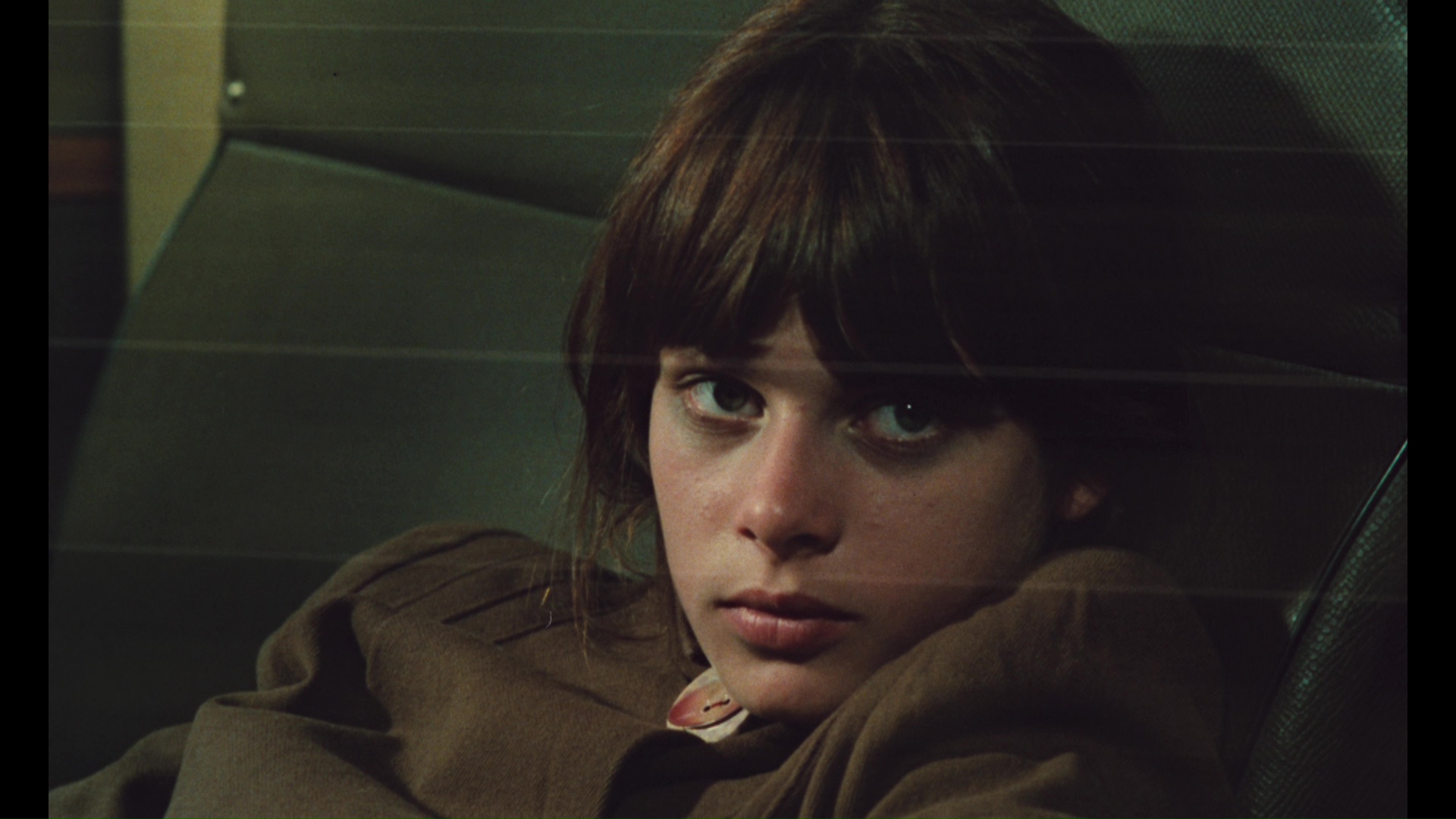
Interestingly, the amount of traditional narrative declines from the first film to the third; what matters here is the journey and the experience of living every day, which is seen at its most optimistic in Alice with its two leads offering a charming pseudo-parental relationship that sticks in the mind long after it's over. 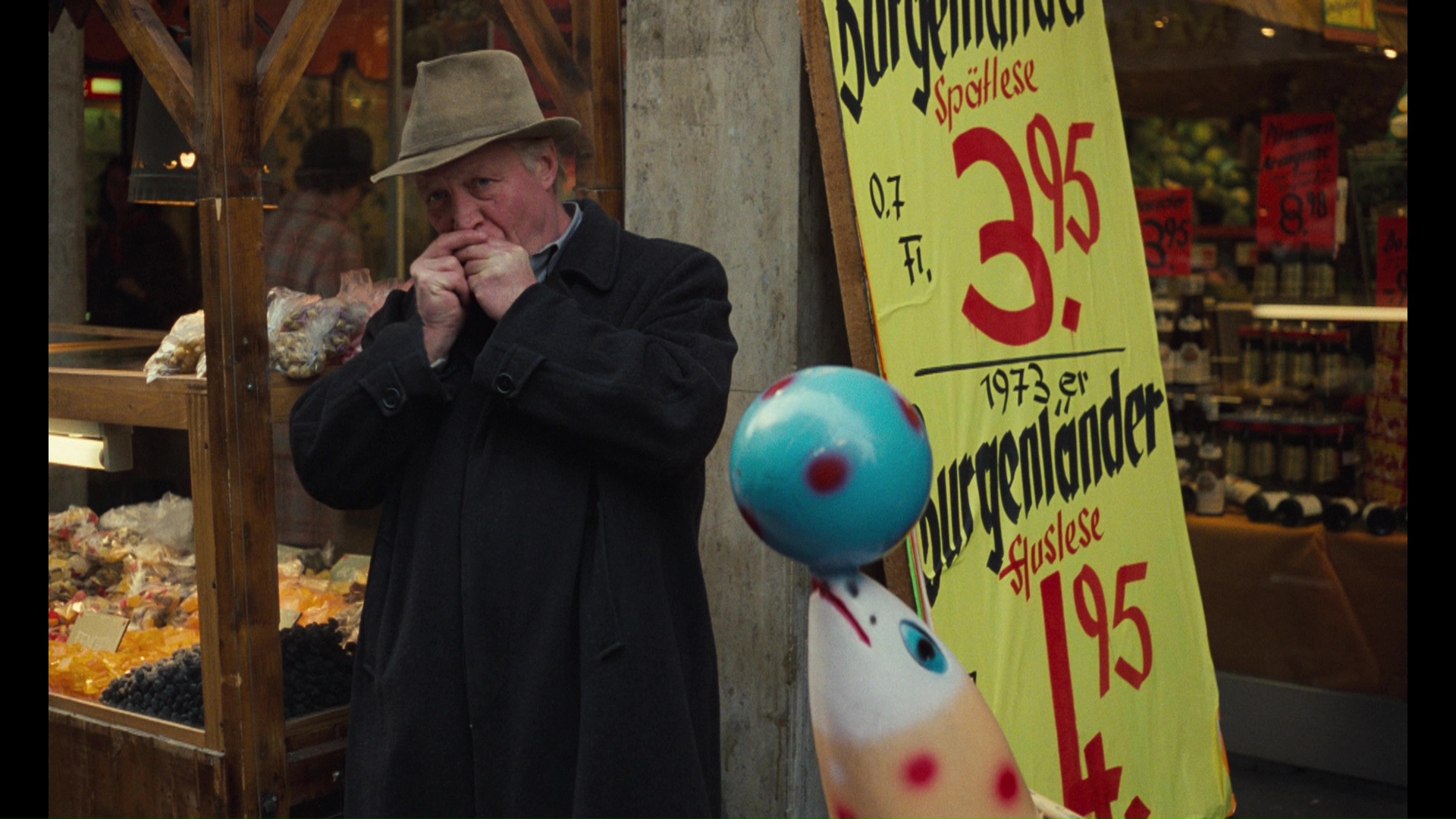 The wandering souls in Wrong Move (the only one in color, oddly enough) are the most difficult to decipher, spouting rhetoric and often failing to connect with each other even under ideal circumstances. In Kings you get an almost entire absence of what would normally be called a story; instead it's a portrait of how traditional cinema seems to be imperiled as much as the soul of postwar Germany still in the throes of a difficult recovery, with gorgeous cinematography and lengthy shots unfolding in real time giving the film a unique look and feel. This also allows Wenders to casually depict male bodily functions in detail you normally don't see outside of extreme student art projects, with Vogler delivering the most startling volley half an hour into the film and the porno projectionist getting caught in a hilariously explicit bit of self indulgence that tends to fly by some viewers before they register what's been happening. Though Alice was shot in 16mm compared to the more polished 35mm of the subsequent two, all of the films are very skillfully lensed and look impressive throughout-- though that wasn't always evident based on ragged, dupey prints in circulation and frequently subpar video copies.
The wandering souls in Wrong Move (the only one in color, oddly enough) are the most difficult to decipher, spouting rhetoric and often failing to connect with each other even under ideal circumstances. In Kings you get an almost entire absence of what would normally be called a story; instead it's a portrait of how traditional cinema seems to be imperiled as much as the soul of postwar Germany still in the throes of a difficult recovery, with gorgeous cinematography and lengthy shots unfolding in real time giving the film a unique look and feel. This also allows Wenders to casually depict male bodily functions in detail you normally don't see outside of extreme student art projects, with Vogler delivering the most startling volley half an hour into the film and the porno projectionist getting caught in a hilariously explicit bit of self indulgence that tends to fly by some viewers before they register what's been happening. Though Alice was shot in 16mm compared to the more polished 35mm of the subsequent two, all of the films are very skillfully lensed and look impressive throughout-- though that wasn't always evident based on ragged, dupey prints in circulation and frequently subpar video copies.
Most of Wenders' pre-Hollywood films enjoyed wide availability on home video in the VHS days, and in fact, the Pacific Arts clamshell tapes of all three of these films were fixtures in Blockbuster 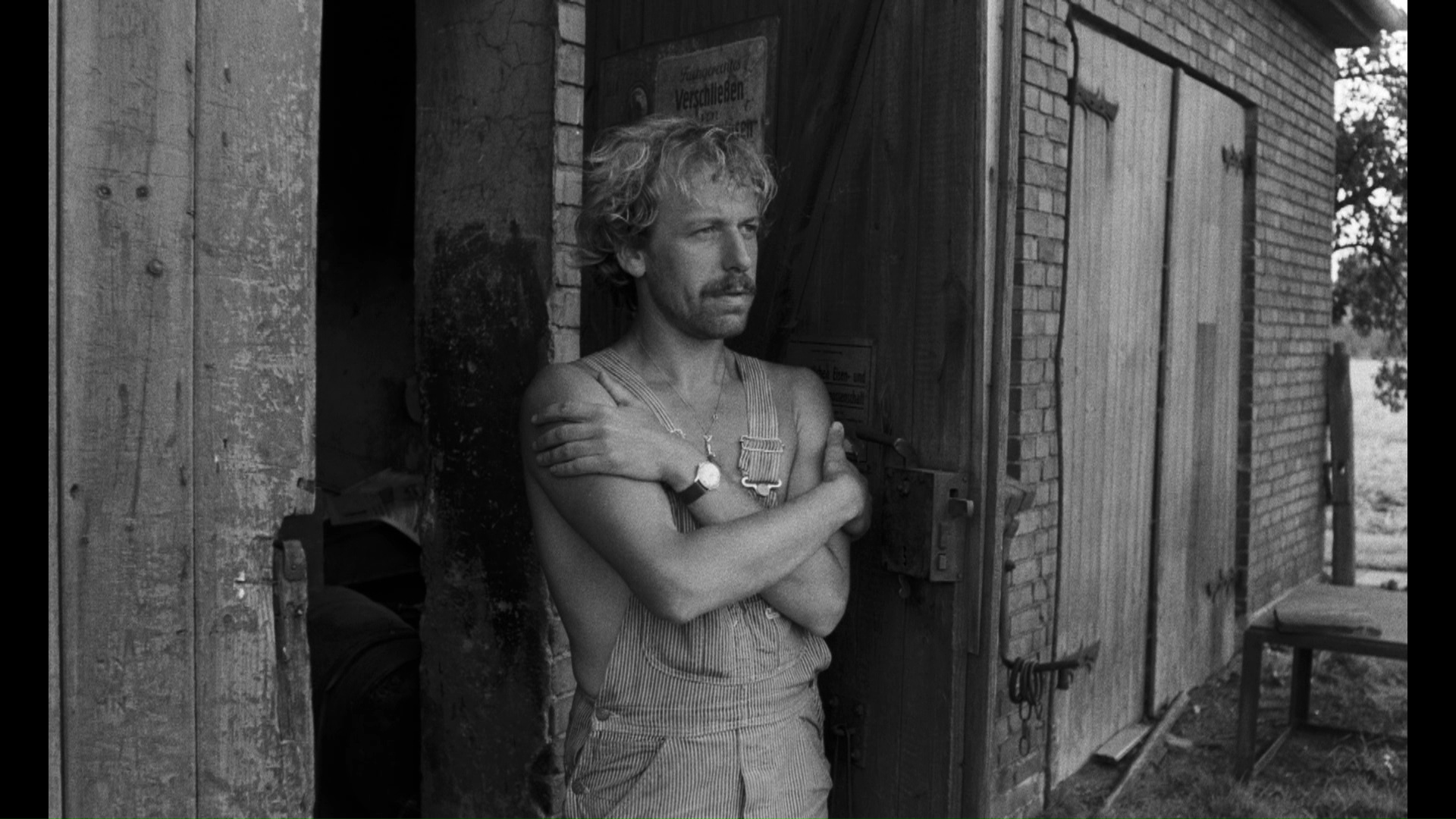 Video stores for at least a decade. Presumably due to its art house status (and the fact that it's a three-hour, black-and-white character study), Kings of the Road ran into no censorship issues in any major countries and was apparently never cut on home video. All three underwent extensive restoration in Germany, which was most difficult in the cases of Alice (whose 16mm negative was used directly to strike 35mm blow-up prints for years) and Kings. However, the end results are truly impressive with the two 35mm titles in particular looking stunningly crisp and clear while maintaining their original, organic grain structure. Wrong Move also features its warm and natural original color palette, so you won't run into that increasingly common Blu-ray curse, the fake blue tint. All films are in German with optional English subtitles; Alice is in LPCM mono, while the other two feature DTS-HD MA 5.1 mixes that still stay
Video stores for at least a decade. Presumably due to its art house status (and the fact that it's a three-hour, black-and-white character study), Kings of the Road ran into no censorship issues in any major countries and was apparently never cut on home video. All three underwent extensive restoration in Germany, which was most difficult in the cases of Alice (whose 16mm negative was used directly to strike 35mm blow-up prints for years) and Kings. However, the end results are truly impressive with the two 35mm titles in particular looking stunningly crisp and clear while maintaining their original, organic grain structure. Wrong Move also features its warm and natural original color palette, so you won't run into that increasingly common Blu-ray curse, the fake blue tint. All films are in German with optional English subtitles; Alice is in LPCM mono, while the other two feature DTS-HD MA 5.1 mixes that still stay 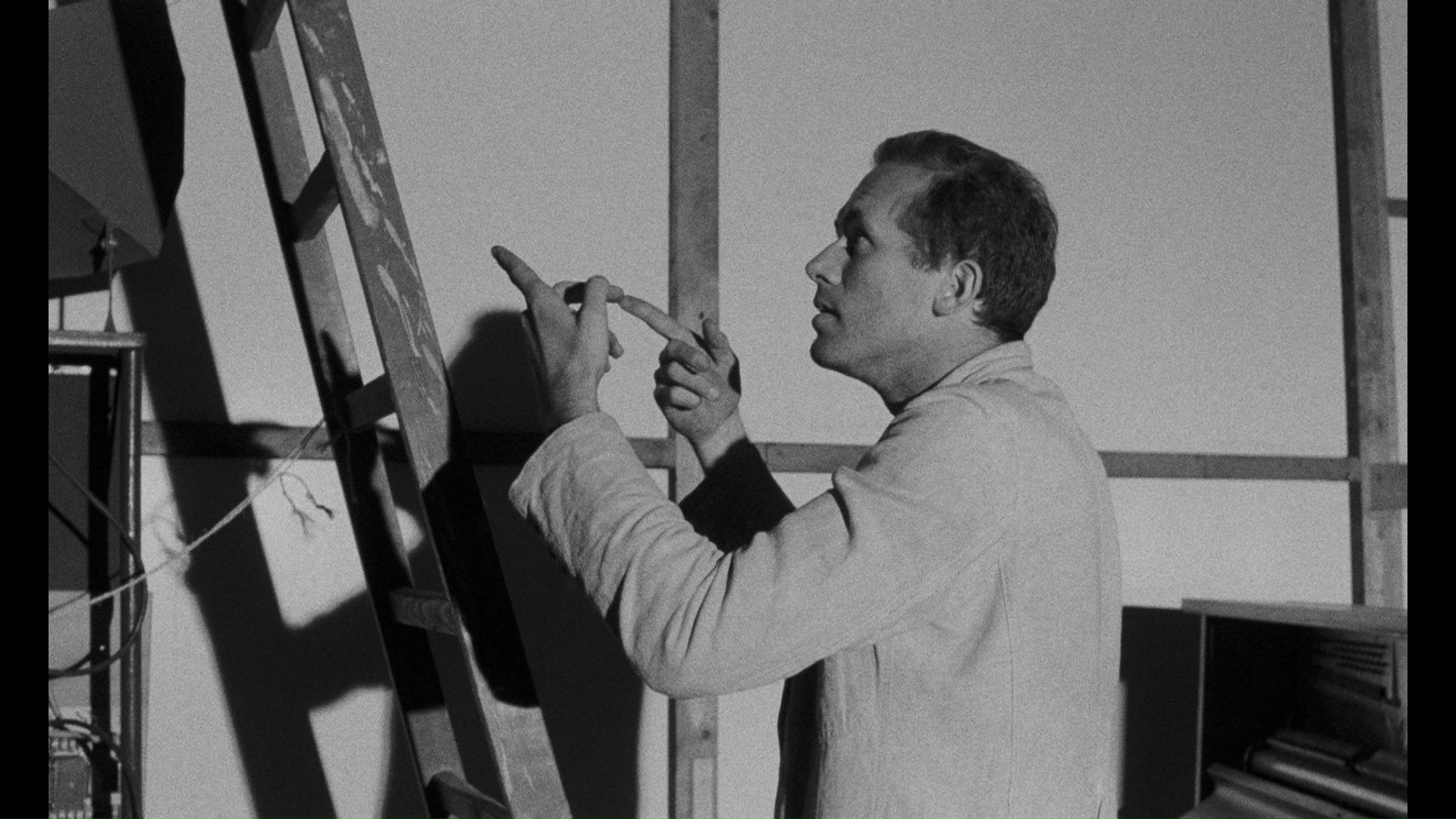 pretty front and center for most of the running time. Wenders' commentaries recorded for the European DVD releases in the mid-'00s are carried over here for all three, packed with details about how the productions were mounted under sometimes high wire conditions (which tends to happen when you're making a movie up in a traveling truck with a tiny crew!) and how the German filmmaking scene was rebuilding itself at the time with the aid of money generated via television. Both of the leads join him for Alice as well, which is also probably the best of the tracks.
pretty front and center for most of the running time. Wenders' commentaries recorded for the European DVD releases in the mid-'00s are carried over here for all three, packed with details about how the productions were mounted under sometimes high wire conditions (which tends to happen when you're making a movie up in a traveling truck with a tiny crew!) and how the German filmmaking scene was rebuilding itself at the time with the aid of money generated via television. Both of the leads join him for Alice as well, which is also probably the best of the tracks.
Video extras are plentiful, with Alice kicking off with the 16-minute "Restoring Time" featurette about The Wim Wenders Foundation and its goals of fostering cinema appreciation; Wenders himself and archivists and film technicians are among the interviewees. 17 minutes of silent outtakes (with score) show some extra travelogue and genial camaraderie among the leads, while Rottländer, Vogler, and Kreuzer appear for a new 28-minute featurette about the making of the film as it was shot in a rather cumbersome fashion 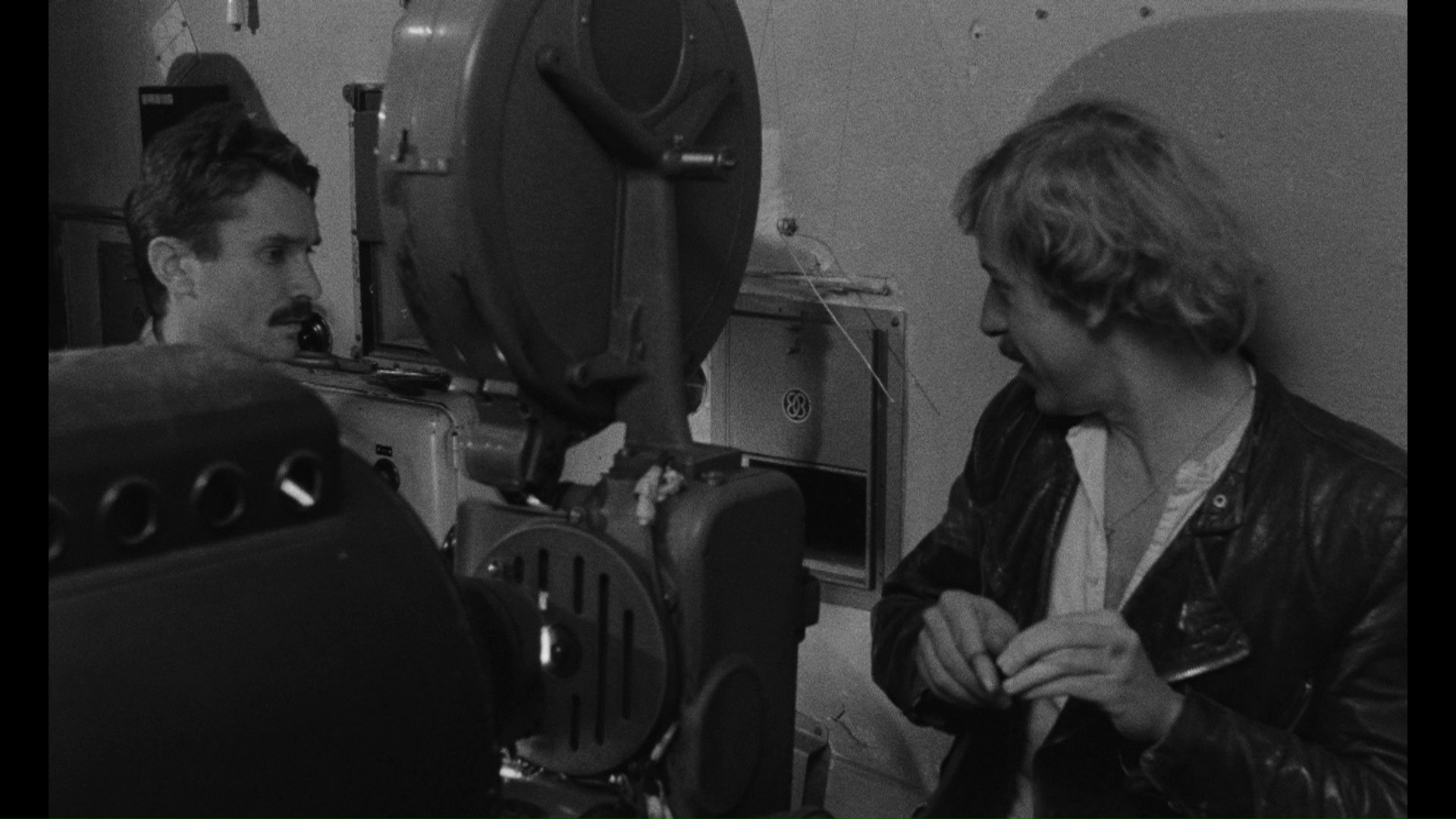 by following the locations more or less as they're seen in the film. Wenders's two earliest surviving shorts are also included, 1967's "Same Player Shoots Again" and 1968's "Silver City Revisited," both fully restored and featuring some actors who play pivotal roles in the main features. Wrong Move contains the most substantial of the new features, a 74-minute Wenders interview with filmmaker Michael Almereyda ("Three For the Road") about the entire trilogy, the crew members who played vital roles across the productions of all three, and the ways they reflected the evolution of Germany at the time. Vogler and Kreuzer return for a 21-minute piece about the second film, including working with the newly discovered Kinski and the story's loose adaptation from a Goethe novel, Wilhelm Meister's Apprenticeship, while a selection of four minutes of production footage shot in Super 8 is also included. Finally, Kings comes with 21 minutes of outtakes and deleted scenes (nothing major apart from some really jubilant footage of Vogler), and Vogler and Kreuzer appear with Zischler for the 31-minute "Travelling Roadshow," which covers everything from the challenges of driving the big truck to the film's unexpected kinship with The Last Picture Show. The substantial boxed set, available in separate Blu-ray and DVD editions, also comes with a nicely designed book featuring essays about the separate films by Almereyda, director Allison Anders (who worked for Wenders when he came to the United States and makes a strong case for Alice as a great female leading character and role model), author James Robison, and critic Nick Roddick, all of whom make strong cases for why these films are still regarded as some of the best of their era.
by following the locations more or less as they're seen in the film. Wenders's two earliest surviving shorts are also included, 1967's "Same Player Shoots Again" and 1968's "Silver City Revisited," both fully restored and featuring some actors who play pivotal roles in the main features. Wrong Move contains the most substantial of the new features, a 74-minute Wenders interview with filmmaker Michael Almereyda ("Three For the Road") about the entire trilogy, the crew members who played vital roles across the productions of all three, and the ways they reflected the evolution of Germany at the time. Vogler and Kreuzer return for a 21-minute piece about the second film, including working with the newly discovered Kinski and the story's loose adaptation from a Goethe novel, Wilhelm Meister's Apprenticeship, while a selection of four minutes of production footage shot in Super 8 is also included. Finally, Kings comes with 21 minutes of outtakes and deleted scenes (nothing major apart from some really jubilant footage of Vogler), and Vogler and Kreuzer appear with Zischler for the 31-minute "Travelling Roadshow," which covers everything from the challenges of driving the big truck to the film's unexpected kinship with The Last Picture Show. The substantial boxed set, available in separate Blu-ray and DVD editions, also comes with a nicely designed book featuring essays about the separate films by Almereyda, director Allison Anders (who worked for Wenders when he came to the United States and makes a strong case for Alice as a great female leading character and role model), author James Robison, and critic Nick Roddick, all of whom make strong cases for why these films are still regarded as some of the best of their era.
Reviewed on May 27, 2016.










